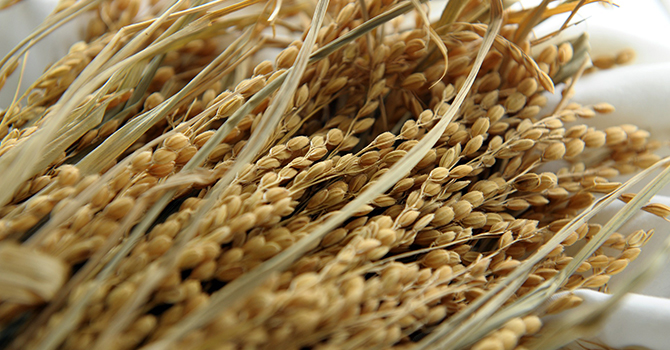What’s With Gluten and Should I Avoid It?

Cassidy Pont
"What is gluten?" Jimmy Kimmel posed this question to pedestrians in Los Angeles who said they maintain a gluten-free diet for a segment on his late night show, Jimmy Kimmel Live. The majority of people interviewed had no idea. This made for a lot of laughs, but it poses an important question: What is gluten and are their health benefits to avoiding it?
Gluten is a general term for a protein found in wheat, rye, and barley that was evolutionary created to germinate plants1,2. Gluten's chemical composition helps trap air and provides elasticity, aiding in the structure and texture of foods; it is known to help foods rise or poof3,1. Some foods that contain gluten are breads, cakes, and pretzels, but gluten is also hidden in foods like soy sauce, couscous, malt, and commercial broths.
Dr. Willam-Karel Dicke, who was a Dutch pediatrician, discovered the gluten-free diet in the 1940s4. During World War II one prominent ingredient disappeared: wheat. Therefore, bread was made with potato starch. After this, the mortality rate of celiac disease (CD) went from 30 percent to 0 percent. Dr. Dicke discovered the link between wheat and the negative effects it had on people with CD. He published a paper discussing this association. Doctors discovered it was the gluten protein in the wheat that was the culprit4.
In general, people follow a gluten-free diet for one of three reasons:
- They have CD and therefore elicit an immune response when gluten is ingested, which damages their small intestine. It causes a host of symptoms, including abdominal pain, bloating, growth problems, osteoporosis, and malnutrition5.
- They have non-celiac gluten sensitivity (NCGS)5, meaning they experience similar gastrointestinal (GI) symptoms when they eat gluten, yet do not have an immune reaction. Not much is known about NCGS, but those with NCGS who take gluten out of their diet no longer have GI ailments5.
- They are taking part in the diet trend and believe it is healthier to avoid gluten. Between 2009 and 2010, 0.52 percent of Americans avoided eating gluten even though they did not have CD or a gluten sensitivity. Just four years later, that percentage rose to 1.69 percent of Americans4.
Some doctors argue that if one does not have a gluten sensitivity or CD, a gluten-free diet will not benefit health status, while others leave the questioned unanswered6,4.
Today, there are numerous gluten-free products that are replicas of gluten-containing items, such as gluten-free muffins and cookies, which contain just as many, if not more, calories and fat than gluten-containing products. Therefore, eating a gluten-free diet may not be healthier for someone who does not have CD of NCGS.
Being a future registered dietitian, I would promote eating a more wholesome diet--rather than a strict gluten-free diet, for the people who do not have CD or NCGS. This type of diet often includes gluten-free foods but does not completely eliminate gluten. Eating a diet rich in fruits, vegetables, and whole grains, like brown rice and quinoa, can enhance health status, and these items are naturally gluten-free.
If you suspect you might have CD or NSGC, consult your doctor.
References
- Celiac Disease Foundation. (2017). What is Gluten? Celiac Disease Foundation. Retrieved from https://celiac.org/live-gluten-free/glutenfreediet/what-is-gluten/
- Lamacchia C., Camarca A., Picascia S., Di Luccia A., Gianfrani C. (2014). Cereal-Based Gluten-Free Food: How to Reconcile Nutritional and Technological Properties of Wheat Proteins with Safety for Celiac Disease Patients. Nutrient, 6(2): 575-590. doi:10.3390/nu6020575.
- Horstmann, S. W., Lynch, K. M., & Arendt, E. K. (2017). Starch Characteristics Linked to Gluten-Free Products. Foods, 6(4), 29. https://www.mdpi.com/2304-8158/6/4/29
- Howard, J. (2017). Gluten-free diets: Where do we stand? CNN. Retrieved from http://www.cnn.com/2017/03/01/health/gluten-free-diet-history-explainer/index.html
- Lebwohl, B., Ludvigsson, J. F., & Green, P. H. R. (2015). Celiac disease and non-celiac gluten sensitivity. The BMJ, 351, h4347. https://www.bmj.com/content/351/bmj.h4347
- Puglise, N. (2016). More Americans are eating gluten-free despite not having celiac disease. The Guardian. Retrieved from https://www.theguardian.com/society/2016/sep/06/gluten-free-eating-celiac-disease-marketing-trend-diet
 About the Author
About the Author
Cassidy Pont is a second-year Master of Public Health student in the Nutritional Sciences Department at the University of Michigan School of Public Health. She is working to obtain her registered dietitian credential. In addition to studying gluten for many years, Pont eats a gluten-free diet due to being diagnosed with NCGS. In the future Pont plans to continue on to the Michigan Public Health Dietetic Internship and work in a community setting systemically impacting children's health via food and nutrition.
